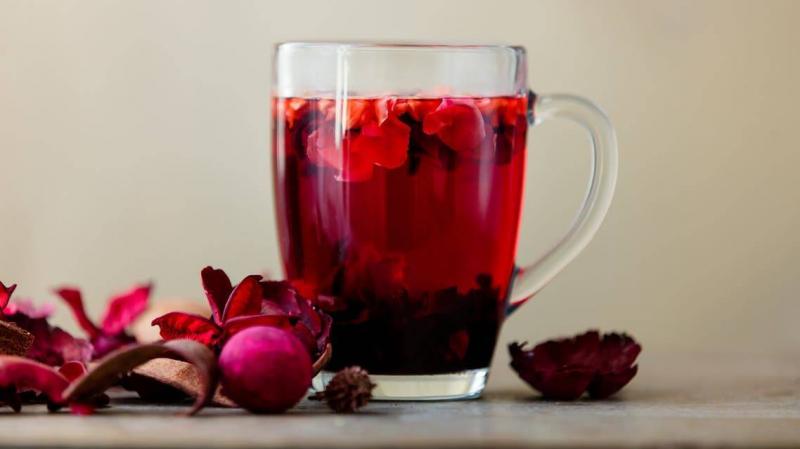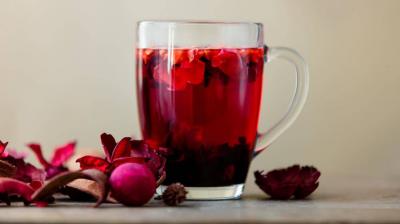Hibiscus is one of the most famous and essential herbal plants due to its use in many traditional treatments and folk medicines. According to the health-focused website "Boldsky," obtaining the best benefits from herbs depends on the dosage and the appropriate preparation method to minimize any potential side effects. There are more than 200 different types of hibiscus in various colors, with "Hibiscus rosa-sinensis," known for its red colors, being the most common. Hibiscus can be used in several ways, depending on the type of ailment. The most common forms of hibiscus are hibiscus tea made from its flowers and leaves, hibiscus oil, hibiscus paste, and hibiscus powder. Hibiscus can also be turned into jams, sauces, or soups and used as cooking ingredients.
**Health Benefits of Hibiscus**
1. **Diabetes**
A scientific study states that "Hibiscus rosa-sinensis" has an antidiabetic effect and can help reduce blood glucose levels in both healthy adults and people with diabetes. Another study mentions that hibiscus can prevent carbohydrate absorption in the intestine, thus potentially reducing glucose spikes after meals.
2. **Pregnant Women with Diabetes**
Pregnant women with diabetes may face some additional challenges during pregnancy, including complications such as higher birth weight, preterm birth, and stillbirth. A study indicated that hibiscus could yield positive effects on pregnant women with diabetes and their offspring due to its richness in phenolic and flavonoid compounds.
3. **Slows the Progression of Breast Cancer**
Results from a scientific study revealed that hibiscus extract, when combined with chemotherapy, could specifically stimulate the elimination of breast cancer cells and prevent its progression. Hibiscus can also help reduce chemotherapy doses and associated toxicity during treatment by minimizing oxidative stress.
4. **Treats High Blood Pressure**
One study suggests that hibiscus flower (Hibiscus sabdariffa L.) has a low toxicity level and is used in many countries worldwide to lower blood pressure. Daily consumption of hibiscus can help reduce both systolic and diastolic blood pressure in individuals with mild to moderate hypertension. The study indicated that the anthocyanin pigment, which gives the hibiscus flower its distinct color, is generally responsible for its blood pressure-lowering activity.
5. **Treats Colds**
Hibiscus contains several phenolic acids like ascorbic, malic, citric, and hydroxydiphenic acid. These acids provide strong anti-inflammatory and antioxidant effects against a range of illnesses, including colds, coughs, and influenza. Hibiscus can help provide immediate relief from coughs and colds when consumed as tea. It can also serve as a great remedy for sore throats and mild headaches.
6. **Prevents Skin Cancer**
A study showed that hibiscus can help prevent the growth of skin cancer cells due to its polyphenol content, which is beneficial for preventing cancer cell development and hindering growth in skin cancer patients.
7. **Good for Heart Health**
Hibiscus aids in treating various heart conditions, such as high blood pressure and high cholesterol, thus maintaining heart health.
8. **Beneficial for Skin**
Hibiscus, particularly its leaves, acts as an excellent skin cleanser. Rubbing hibiscus leaves on the face and neck can help remove dead skin cells and blackheads or whiteheads, making the skin smooth and soft. The anti-inflammatory properties in hibiscus also help treat skin issues like acne and dry skin. It can further assist in slowing down aging caused by harmful UV rays by increasing collagen production and reducing melanin synthesis.
9. **Good for Hair**
Studies suggest that a paste made from ground hibiscus leaves and petals can be used for hair. Hibiscus is known to give hair a dark color and reduce dandruff when applied after shampooing. Besides minimizing hair loss, hibiscus can also help prevent premature graying.
10. **Wound Healing**
One study indicates that hibiscus has a significant effect on wound healing compared to commonly used ointments and topical treatments for infected burns and skin infections. Hibiscus helps enhance cell growth and collagen formation at the wound site and accelerates the healing process while reducing scars and pain associated with injuries.




